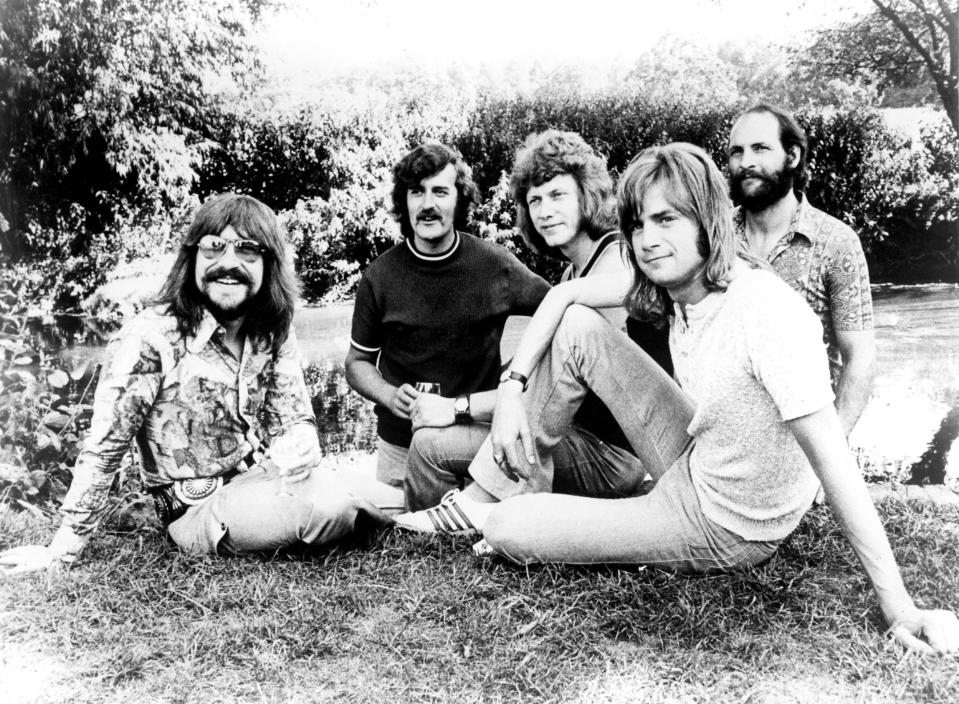Mike Pinder Dies: Moody Blues’ Co-Founding Keyboard Player Was 82

Mike Pinder, who co-founded the Moody Blues and played keyboards and mellotron and sang on the Rock and Roll Hall of Fame group’s first nine albums, died Wednesday at his home in Northern California. He was 82 and was the last surviving founding member of the legendary British band.
His longtime bandmate John Lodge announced the news on social media via Pinder’s family. “He passed peacefully [and] his final days were filled with music, encircled by the love of his family,” his Facebook post said. “Michael lived his life with a childlike wonder, walking a deeply introspective path which fused the mind and the heart.”
More from Deadline
Pinder’s death follows that of fellow Moodys co-founding guitarist Denny Laine in December and drummer Graeme Edge in 2021. Ray Thomas died in 2002 and Clint Warwick in 2004. Lodge and lead singer Justin Heyward joined in 1966.
Pinder co-formed the group in Birmingham just as the British Invasion was hitting America. The Moody Blues crashed onto the international rock scene with their first hit, 1965’s “Go Now,” which went No. 1 in the UK and went top 10 in the States. The group went on to have two more U.S. Top 10 singles and three in the UK but were much more successful on the albums charts.
Among the Moody Blues’ most famous songs are “Tuesday Afternoon” and “Nights in White Satin” — both from 1968’s Days of Future Passed LP that featured the London Symphony Orchestra — “Ride My See-Saw,” “Question,” “The Story in Your Eyes” and “I’m Just a Singer (in a Rock and Roll Band)” — all of which remain popular on classic rock radio. The group’s “Legend of a Mind” was about the acid king Timothy Leary.

“Nights in White Satin” didn’t make the Billboard Hot 100 in its original release, but it was reissused as a single in the States in 1972 and became the group’s biggest pop hit here. The song spent two weeks at No. 2 — held out of the pole position by Johnny Nash’s “I Can See Clearly Now.”
The Moody Blues’ sound evolved to include more classical elements and instruments, and Days of Future Passed began a string of hit albums for the Moody Blues that included 10 consecutive gold or platinum discs in the U.S. Three of those hit No. 1 in the UK: 1969’s On the Threshold of a Dream — which hit the top spot twice, seven months apart — and To Our Children’s Children’s Children, 1970’s A Question of Balance and 1971’s Every Good Boy Deserves Favour. The following year’s Seventh Sojourn was the band’s first U.S. chart-topper, ruling the Billboard 200 for five weeks.
After that, the Moody Blues went on hiatus from 1974-77, returning with the 1978 LP Octave. Pinder left the group soon after its release.
Born on December 27, 1941, in Birmingham, England, Pinder was among the first to incorporate the mellotron into rock music. He also co-wrote some of the Moody Blues’ songs including “(Thinking is) The Best Way To Travel,” “Om” and the suite “Have You Heard/The Voyage/Have You Heard (Part 2),” the latter of which closed On the Threshold of a Dream. Pinder also provided narration on that album’s track “The Dream.”
DEADLINE RELATED VIDEO:
Best of Deadline
Hollywood & Media Deaths In 2024: Photo Gallery & Obituaries
2024 Premiere Dates For New & Returning Series On Broadcast, Cable & Streaming
'Wednesday' Season 2: Everything We Know About The Cast, Premiere Date & More
Sign up for Deadline's Newsletter. For the latest news, follow us on Facebook, Twitter, and Instagram.


